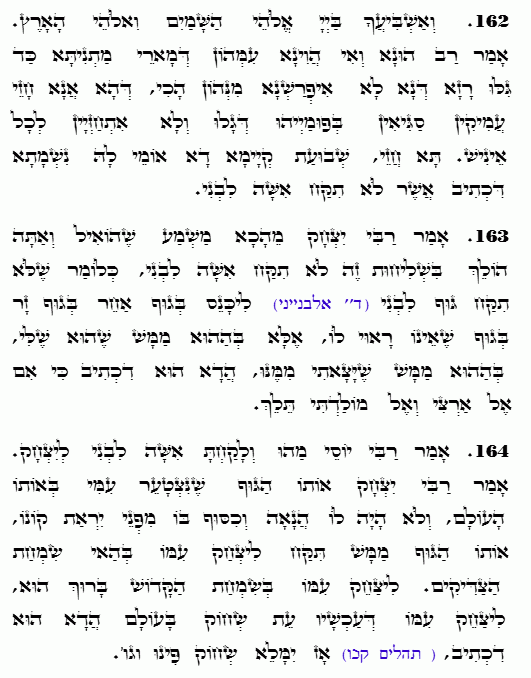Daily Zohar # 4709 – Chayei Sarah – The dead will first arise with their defects
Daily Zohar 4709

Hebrew translation:
163. אָמַר רַבִּי יִצְחָק, מִכָּאן מַשְׁמָע, שֶׁהוֹאִיל וְאַתָּה הוֹלֵךְ בִּשְׁלִיחוּת זוֹ, לֹא תִקַּח אִשָּׁה לִבְנִי. כְּלוֹמַר שֶׁלֹּא תִקַּח גּוּף לִבְנִי [לְבִנְיָנִי] לְהִכָּנֵס בְּגוּף אַחֵר, בְּגוּף זָר, בְּגוּף שֶׁאֵינוֹ רָאוּי לוֹ, אֶלָּא בְּהַהוּא מַמָּשׁ שֶׁהוּא שֶׁלִּי, בְּהַהוּא מַמָּשׁ שֶׁיָּצָאתִי מִמֶּנּוּ. זֶהוּ שֶׁכָּתוּב כִּי אִם אֶל אַרְצִי וְאֶל מוֹלַדְתִּי תֵּלֵךְ.
164. אָמַר רַבִּי יוֹסֵי, מַהוּ וְלָקַחְתָּ אִשָּׁה לִבְנִי לְיִצְחָק? אָמַר רַבִּי יִצְחָק, אוֹתוֹ הַגּוּף שֶׁנִּצְטַעֵר עִמִּי בְּאוֹתוֹ הָעוֹלָם וְלֹא הָיָה לוֹ הֲנָאָה וְכִסּוּף בּוֹ מִפְּנֵי יִרְאַת קוֹנוֹ, אוֹתוֹ הַגּוּף מַמָּשׁ תִּקַּח לִצְחַק עִמּוֹ בְּשִׂמְחַת הַצַּדִּיקִים הַזּוֹ, לִצְחַק עִמּוֹ בְּשִׂמְחַת הַקָּדוֹשׁ בָּרוּךְ הוּא, לִצְחַק עִמּוֹ שֶׁעַכְשָׁו עֵת שְׂחוֹק בָּעוֹלָם. זֶהוּ שֶׁכָּתוּב (תהלים קכו) אָז יִמָּלֵא שְׂחוֹק פִּינוּ וגו’.
.
Zohar Chayei Sarah
Continued from previous DZ
#162
“וְאַשְׁבִּיעֲךָ בַּה’ אֱלֹהֵי הַשָּׁמַיִם וֵאלֹהֵי הָאָרֶץ” “And I will make you swear by YHVH, the God of the heavens…” (Genesis 24:3): Rabbi Huna said, “If I had been with the sages of the Baraita (the authors of early rabbinic teachings) at the time they revealed the secret of this verse, I would not have separated from them until I knew everything, for I see profound depth in their words. They revealed much, yet their teachings are not easily understood by everyone.
Come and see: The oath of this covenant is an oath of the soul, as it is written, “אֲשֶׁר לֹא תִקַּח אִשָּׁה לִבְנִי” “that you shall not take a wife for my son” (Genesis 24:3). For Abraham represents the aspect of the soul, as previously explained (#48).
Notes:
Rabbi Huna is awed by the profound teachings of the sages who delved into this verse’s secrets. His yearning to fully understand their insights highlights the vastness of Torah’s wisdom and the humility required to approach it.
Finding a wife for Isaac is an allegory for the reunion of the soul with the body during the Resurrection. The text emphasizes the enduring significance of the body, particularly the luz bone, which remains intact and pure as the foundation for the Resurrection.
#163
Rabbi Yitzchak said: “From here, we learn that the soul said to Metat–: ‘Since you are going on this mission,’—that is, to resurrect the dead—’ לֹא תִקַּח אִשָּׁה לִבְנִי’ ‘do not take a wife for my son,’ meaning, do not take a body for my son. Compared to the soul, the body is referred to as a ‘wife.’ The soul instructed Metat– not to enter into another body, a foreign body, or a body that is unworthy of it, but only into the very same body that is its own—the one from which it originally departed. This is the meaning of the verse: “כִּי אִם אֶל אַרְצִי וְאֶל מוֹלַדְתִּי תֵּלֵךְ” “Only to my land and my birthplace shall you go” (Genesis 24:4).
The sages taught:” עתידים המתים להחיות במומם שלא יאמרו אחר הוא” “The dead will arise with their defects, so it will not be said, ‘This is someone else.'” The meaning is that the resurrected body will appear in the same form as it was when they were part of the Endless (Ein Sof, Blessed be He). Therefore, the soul binds Metat– with the oath, “To my land and my birthplace you shall go,”—referring to my original body, which remains preserved through the secret of the luz bone. This bone is the essence of the body from which the soul departed, and it is the body suitable for Resurrection. After the body is healed from its defects, it will be fit for the soul to get dressed with the original body.
#164
Rabbi Yossi said: “What is the meaning of the verse: ‘וְלָקַחְתָּ אִשָּׁה לִבְנִי לְיִצְחָק’ ‘And you shall take a wife for my son, for Isaac’ (Genesis 24:4)? If the intention is the soul’s embodiment, it should have said, ‘for Abraham.'” Rabbi Yitzchak answered: “This refers to the same body that suffered with me in the lower world, the body that did not partake of pleasures and indulgences because of its reverence for its Creator. That is the luz bone, which does not benefit from food and drink in this world, as explained above. This exact body shall be taken to rejoice with, to share in the joy of the Tzadikim, and to rejoice with the Creator in the joy of the Resurrection. This is the meaning of the verse: ‘אָז יִמָּלֵא שְׂחוֹק פִּינוּ’ ‘Then our mouths will be filled with laughter’ (Psalms 126:2).”
Notes:
The Zohar teaches that the Resurrection of the body, from the luz bone, is not only a restoration but a celebration of the body’s partnership with the soul in fulfilling Hashem’s will. The body that endured the trials of earthly life is deemed worthy of eternal rejoicing, reflecting the triumph of supernal justice and harmony.
This teaching inspires reverence for the physical body as integral to spiritual growth and redemption. It also highlights the joy and unity that the Resurrection brings, fulfilling the divine promise of eternal life and celebration. “Then our mouths will be filled with laughter” captures the profound joy of this reunion, a moment of rejoicing in the ultimate fulfillment of Hashem’s plan.
{||}

 Previous: Chayei Sarah
Previous: Chayei Sarah

